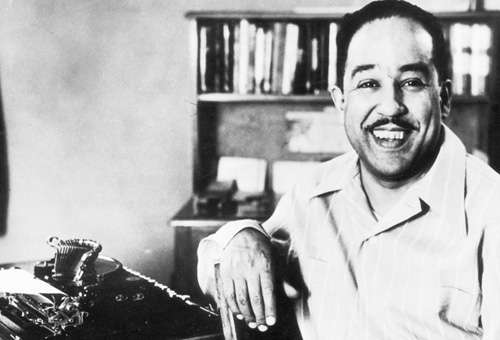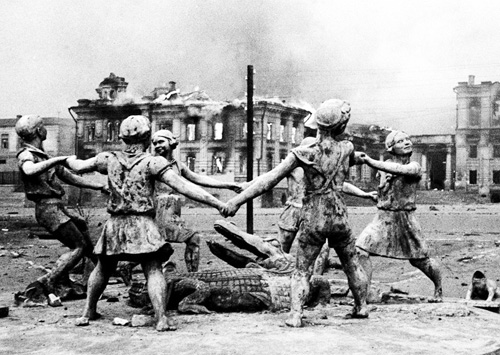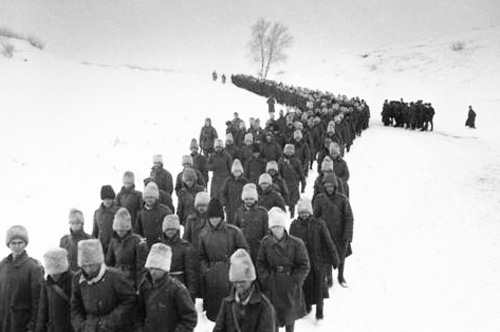BLACK HISTORY MONTH: Langston Hughes was more than 'a raisin in the sun'...
Better late than never, today Substance begins our Black History Month lessons for our readers to use and enjoy. And it's appropriate to begin with Langston Hughes, a great poet, activist, radical (a member of the Communist Party for years), and gay rights activist. Among other things...
 Langston Hughes at his typewriter. He began his writing career at his high school newspaper in Cleveland and became one of the most prolific poets, essayists, and activists of the first half of the 20th Century.Here is a Langston Hughes trivial question. Why isn't the phrase "But you ain't dead!" from a famous Langston Hughes poem as famous as, say, that "Raisin in the Sun" line? The 113th anniversary of the birth of one of America's most talented and prolific poets, writers and activists -- Langston Hughes -- also gives us the opportunity to put into the historical record for Chicago's Black History Month. We need a bit more than the oversimplifications that have dominated the Black History Month agenda in Chicago for as long as most of us can remember.
Langston Hughes at his typewriter. He began his writing career at his high school newspaper in Cleveland and became one of the most prolific poets, essayists, and activists of the first half of the 20th Century.Here is a Langston Hughes trivial question. Why isn't the phrase "But you ain't dead!" from a famous Langston Hughes poem as famous as, say, that "Raisin in the Sun" line? The 113th anniversary of the birth of one of America's most talented and prolific poets, writers and activists -- Langston Hughes -- also gives us the opportunity to put into the historical record for Chicago's Black History Month. We need a bit more than the oversimplifications that have dominated the Black History Month agenda in Chicago for as long as most of us can remember.
Having a thousands classrooms echo with all that "Raisin in the Sun" stuff is fine. That poem, in context and with respect for the vast career of the man, is worth remembering, and even reciting.
Marking February 1 as the anniversary of Hughes's birthday was important. But in terms of his work, February 2 (the anniversary of the important victory for human freedom at Stalingrad, about which Hughes wrote a major poem) was equally important.
 One of the iconic photographs taken during the Battle of Stalingrad. Langston Hughes' poem, published in The New Masses in March 1943, captured some of the joy of African Americans at the Red Army victory. Throughout World War II, black American activists fought their "two front war" -- against racism at home in the USA and against fascism abroad.The poem Hughes published in the March 1943 issue of the New Masses to celebrate the victory of the Red Army over the Nazis' Sixth Army in the Battle of Stalingrad should be studied as much as the "Raisin in the Sun" poem. It was on February 2, 1943 that Nazi General Von Paulus formally sat across the table from the Red Army commanders (although he refused to use the word "surrender", possibly because his assistant, a general named Schmidt, was sitting beside him?) surrendered the German Sixth Army, which two years earlier had conquered France using the Blitzkrieg.
One of the iconic photographs taken during the Battle of Stalingrad. Langston Hughes' poem, published in The New Masses in March 1943, captured some of the joy of African Americans at the Red Army victory. Throughout World War II, black American activists fought their "two front war" -- against racism at home in the USA and against fascism abroad.The poem Hughes published in the March 1943 issue of the New Masses to celebrate the victory of the Red Army over the Nazis' Sixth Army in the Battle of Stalingrad should be studied as much as the "Raisin in the Sun" poem. It was on February 2, 1943 that Nazi General Von Paulus formally sat across the table from the Red Army commanders (although he refused to use the word "surrender", possibly because his assistant, a general named Schmidt, was sitting beside him?) surrendered the German Sixth Army, which two years earlier had conquered France using the Blitzkrieg.
Langston Hughes' career was part of history, and he marked each important event as his career developed. Those who wish more about that piece of history can easily find it, with some Paulus stuff beginning on You Tube at http://www.youtube.com/watch?v=_6w6F0gFzaw.
The Langston Hughes library and material is so vast that a child beginning today might make a career out of the study of this one American poet, writer, activist and human being. (But then that child would not be doing much test prep and might not get accepted into a selective enrollment high school or Harvard..).
Here is the Langston Hughes poem "Good Morning, Stalingrad!"
 The first great trove of prisoners as the Red Army circle closed in around the Nazi Sixth Army inside the Stalingrad pocket was the Romanians (above, notable by their distinctive winter hats and the facts that they surrendered without serious casualties), the first of more than 150,000 Nazi prisoners taken before the battle finally ended with the Red Army victory in February 1943. Soviet planners knew that the weak links in the entire Nazi battle plan at Stalingrad were the north and south flanks, which were held by the Romanians. Good morning, Stalingrad!
The first great trove of prisoners as the Red Army circle closed in around the Nazi Sixth Army inside the Stalingrad pocket was the Romanians (above, notable by their distinctive winter hats and the facts that they surrendered without serious casualties), the first of more than 150,000 Nazi prisoners taken before the battle finally ended with the Red Army victory in February 1943. Soviet planners knew that the weak links in the entire Nazi battle plan at Stalingrad were the north and south flanks, which were held by the Romanians. Good morning, Stalingrad!
Lots of folks who don�t like you
Had give you up for dead.
But you ain�t dead!
Goodmorning, Stalingrad!
Where I live down in Dixie
Things is bad �
But they�re not so bad
I still can�t say,
Goodmorning Stalingrad!
And I�m not so dumb
I still don�t know
That as long as your red star
Lights the sky,
We won�t die.
Goodmorning Stalingrad!
You�re half a world away or more
But when your guns roar,
They roar for me �
And for everybody
who want to be free.
Goodmorning Stalingrad!
Some folks try to tell me down this way
That you�re our ally just for today.
That may be so � for those who want it so.
But as for me � you�re my ally
Until we all free.
Goodmorning Stalingrad!
When crooks and klansmen
Lift their heads and things is bad,
I can look way across the sea
And see where simple working folks like me
Lift their heads, too, with gun in hand
To drive the fascists from the land.
You�ve stood between us well,
Stalingrad!
The folks who hate you�d
Done give you up for dead �
They were glad.
But you ain�t dead!
And you won�t be
As long as I am you
And you are me �
For you have allies everywhere,
All over the world, who care.
And they
Are with you more
Than just today.
]Listen! I don�t own no radio �
Can�t send no messages through the air.
But I reckon you can hear me,
Anyhow, away off there.
And I know you know
I mean it when I say,
(Maybe in a whisper
To keep the Klan away)
Goodmorning, Stalingrad!
I�m glad
You ain�t dead!
GOODMORNING, STALINGRAD!
Readers who need to learn more about the career of Langston Hughes can also study the magazine The New Masses where Hughes published much of his work.
For the record (thanks to Wikipedia and other sources)...
"James Mercer Langston Hughes (February 1, 1902 � May 22, 1967) was an American poet, social activist, novelist, playwright, and columnist. He was one of the earliest innovators of the then-new literary art form called jazz poetry. Hughes is best known as a leader of the Harlem Renaissance. He famously wrote about the period that "the negro was in vogue" which was later paraphrased as "when Harlem was in vogue".
According to Wikipedia, "Both of Hughes' paternal great-grandmothers were African-American and both of his paternal great-grandfathers were white slave owners of Kentucky. According to Hughes, one of these men was Sam Clay, a Scottish-American whiskey distiller of Henry County and supposedly a relative of Henry Clay, and the other was Silas Cushenberry a Jewish-American slave trader of Clark County." Hughes's maternal grandmother Mary Patterson was of African-American, French, English and Native American descent. One of the first women to attend Oberlin College, she first married Lewis Sheridan Leary, also of mixed race. Lewis Sheridan Leary subsequently joined John Brown's Raid on Harper's Ferry in 1859 and died from his wounds."
"In 1869 the widow Mary Patterson Leary married again, into the elite, politically active Langston family. Her second husband was Charles Henry Langston, of African-American, Native American, and Euro-American ancestry. He and his younger brother John Mercer Langston worked for the abolitionist cause and helped lead the Ohio Anti-Slavery Society [6] in 1858. Charles Langston later moved to Kansas, where he was active as an educator and activist for voting and rights for African Americans.[4] Charles and Mary's daughter Caroline was the mother of Langston Hughes."
Langston Hughes was born in Joplin, Missouri, the second child of school teacher Carrie (Caroline) Mercer Langston and James Nathaniel Hughes (1871�1934). Langston Hughes grew up in a series of Midwestern small towns. Hughes's father left his family and later divorced Carrie, going to Cuba, and then Mexico, seeking to escape the enduring racism in the United States.
"After the separation of his parents, while his mother traveled seeking employment, young Langston Hughes was raised mainly by his maternal grandmother, Mary Patterson Langston, in Lawrence, Kansas. Through the black American oral tradition and drawing from the activist experiences of her generation, Mary Langston instilled in her grandson a lasting sense of racial pride. He spent most of his childhood in Lawrence, Kansas. After the death of his grandmother, he went to live with family friends, James and Mary Reed, for two years. In Big Sea he wrote, "I was unhappy for a long time, and very lonesome, living with my grandmother. Then it was that books began to happen to me, and I began to believe in nothing but books and the wonderful world in books � where if people suffered, they suffered in beautiful language, not in monosyllables, as we did in Kansas".
"Later, Hughes lived again with his mother Carrie in Lincoln, Illinois. She had remarried when he was still an adolescent, and eventually they lived in Cleveland, Ohio, where he attended high school."
While in grammar school in Lincoln, Hughes was elected class poet. Hughes stated that in retrospect he thought it was because of the stereotype that African Americans have rhythm.[14]
"I was a victim of a stereotype. There were only two of us Negro kids in the whole class and our English teacher was always stressing the importance of rhythm in poetry. Well, everyone knows, except us, that all Negroes have rhythm, so they elected me as class poet."
During high school in Cleveland, he wrote for the school newspaper, edited the yearbook, and began to write his first short stories, poetry, and dramatic plays. His first piece of jazz poetry, "When Sue Wears Red", was written while he was in high school.
And lots more that is now available thanks to the Internet.
Happy Black History Month to the new generation of Resistance fighters in the USA in honor of those who plowed the prairies and built the cities where they trade in generations before us. If you're read this far, please begin singing "Solidarity Forever" with us at the beginning of each meeting of CORE (The Caucus Of Rank and file Educators) every month. You can learn more about CORE, and CORE's place in BLACK HISTORY MONTH, at www.coreteachers.org.
One of the best brief obituaries for Langston Hughes was published in The New York Times upon his death in 1967:
May 23, 1967
OBITUARY, Langston Hughes, Writer, 65, Dead, By THE NEW YORK TIMES
Langston Hughes, the noted writer of novels, stories, poems and plays about Negro life, died last night in Polyclinic Hospital at the age of 65.
Mr. Hughes was sometimes characterized as the "O. Henry of Harlem." He was an extremely versatile and productive author who was particularly well known for his folksy humor.
In a description of himself written for "Twentieth Century Authors, a biographical dictionary, Mr. Hughes wrote:
"My chief literary influences have been Paul Laurence Dunbar, Carl Sandburg and Walt Whitman. My favorite public figures include Jimmy Durante, Marlene Dietrich, Mary McLeod Bethune, Mrs. Franklin D. Roosevelt, Marian Anderson and Henry Armstrong."
"I live in Harlem, New York City," his autobiographical sketch continued. "I am unmarried. I like 'Tristan,' goat's milk, short novels, lyric poems, heat, simple folk, boats and bullfights; I dislike 'Aida,' parsnips, long novels, narrative poems, cold, pretentious folk, buses and bridges."
It was said that whenever Mr. Hughes had a pencil and paper in his hands, he would scribble poetry. He recalled an anecdote about how he was "discovered" by the poet Vachel Lindsay.
Lindsay was dining at the Wardman Park Hotel in Washington when a busboy summoned his courage and slipped several sheets of paper beside the poet's plate. Lindsay was obviously annoyed, but he picked up the papers and read a poem titled "The Weary Blues."
As Lindsay read, his interest grew. He called for the busboy and asked, "Who wrote this!"
"I did," replied Langston Hughes.
Lindsay introduced the youth to publishers who brought out such works by the rising poet and author as "Shakespeare in Harlem," "The Dream Keeper," "Not Without Laughter, "The Ways of White Folks," "The Big Sea" and "Popo And Fifina" as well as the initial "The Weary Blues."
"My writing," Mr. Hughes said, "has been largely concerned with the depicting of Negro life in America."
He also translated the poems of Negro writers in Cuba and Haiti because, Mr. Hughes noted, one of his main interests was "the encouragement of literary ability among colored writers."
In one of his many anecdotes Mr. Hughes explained how he became a poet when he was named "class poet" in grammar school in Lincoln, Ill.
"I was a victim of a stereotype," he observed wryly. "There were only two of us Negro kids in the whole class and our English teacher was always stressing the importance of rhythm in poetry.
"Well, everybody knows--except us--that all Negroes have rhythms, so they elected me class poet. I felt I couldn't let my white classmates down, and I've been writing poetry ever since."
James Langston Hughes, who dropped his first name, was born in Joplin, Mo., on Feb. 1, 1902. His mother was a school teacher and his father was a storekeeper.
After his graduation from Central High School to Cleveland, he went to Mexico and then attended Columbia University for a year. Mr. Hughes held a variety of jobs, including seaman on trips to Europe and Africa, cook in a Montmartre nightclub in Paris and then busboy at the Washington hotel where he presented his poetry to Lindsay.
His first book, "The Weary Blues," was published by Alfred A. Knopf in 1925.
A scholarship then enabled him to complete his education at Lincoln University, from which he graduated in 1929.

